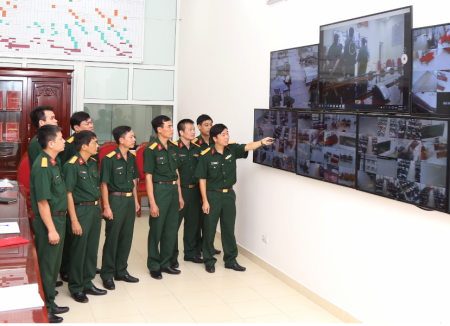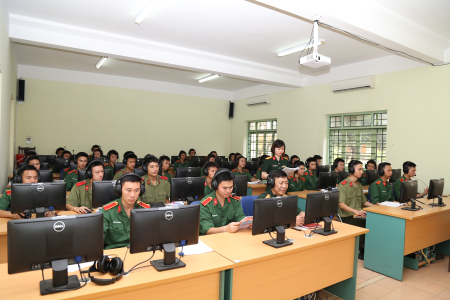Military Logistics Academy actively builds the model of “smart school approaching the 4th industrial revolution”
Over the years, the Military Logistics Academy (MLA) has always grasped and strictly executed resolutions and directives by the Party, State, Central Military Commission, and Ministry of National Defence (MND) on education and training. Notably, the MLA has proactively, actively executed the Prime Minister’s Directive 16/CT-TTg, dated May 4th 2017, on enhancing the capacity to approach the 4th industrial revolution and the MND’s Decision 889/QĐ-BQP, dated March 22nd 2018, on approving “the military schools’ plan to deal with the impacts made by the 4th industrial revolution in the period of 2018-2020 and beyond” in accordance with the particularities of a training centre for military finance and logistics. It has developed its own action plan with various synchronous measures, with emphasis placed on building the MLA into “a smart school capable of approaching the 4th industrial revolution.” To that end, the MLA has focused on building high-calibre personnel, modernizing its facilities, equipment, and technological resources in line with the trend of the 4th industrial revolution, and ensuring the inheritance, economization, and effectiveness, thereby achieving significant initial outcome. The information technology and foreign language capacity of its cadres, instructors, and technical staffs has been raised. The system of multi-functional classrooms, libraries, laboratories, and practice rooms has been upgraded and basically modernized. Priority has been given to completing the information technology facilities. It has succeeded in launching the system of computers-based training management and operation, designed and employed software for building the training schedules, organizing rehearsals and exercises for all majors, and developed simulation training classrooms. Doing so has helped it to achieve considerable improvements in its education, training, scientific research, and task performance.
 |
| Sr. Col. Phan Tung Son inspecting the training work at the MLA’s Training Operation Centre |
Building the MLA into a smart school imposes new, high requirements on the Academy while its resources are limited, which causes the Academy a lot of difficulties. At present, the task of military build-up and Homeland defence in the new situation and the great impacts by the 4th industrial revolution are imposing high requirements on the Military’s education and training work in general, the MLA’s in particular. To seize the opportunity, take advantage of this revolution’s achievements, overcome all difficulties and challenges, and fulfil the targets of building the MLA into a smart school, it has been adopting measures for performing its tasks comprehensively, with a focus on the following.
First, enhancing all-level party committees and commands’ leadership and direction over the task of education and training reform and the building of a smart school. The MLA has directed its offices, faculties, and cadet management units to more thoroughly grasp higher echelons’ resolutions and directives, particularly the 12th Party Central Committee’s Resolution 29-NQ/TW on a fundamental, comprehensive reform in education and training, the Prime Minister’s 16/CT-TTg, the Strategy for education and training development within the Military in the period of 2011-2020, and the military schools’ plan to deal with the impacts made by the 4th industrial revolution in the period of 2018-2020 and beyond. Grounded on those documents, the MLA has been fully aware of the necessity of reforming education and training and standardizing, modernizing, and making the Academy capable of approaching the 4th industrial revolution, while strengthening the leadership and direction of MLA’s Party Committee and Board and all-level party committees and commands over this important work. All-level party committees and organizations have included the building of a smart school in their resolutions and frequently assessed the results of implementation of those resolutions to opportunely draw lessons. While introducing the task to its staff members and building up their responsibility, the MLA has directed its affiliates to continue formulating their action plans relevant to their function and assigned tasks. In the school year of 2019-2020, the MLA has focused on consolidating the Steering Board and Advisory Group for applying the 4th industrial revolution’s achievements and taking breakthrough measures for approaching and employing digital technology in its training and research missions. The MLA has combined the targets of building a smart school with the implementation of the Politburo’s Directive 05-CT/TW, Determination to Win Emulation Movement, and campaigns, attached importance to building and multiplying typical examples of information technology application and development, and settled the signs of conservatism in the process.
Second, renewing the training procedure and program and raising the effectiveness of applying information technology to teaching and learning. The MLA’s primary target of building a smart school is to improve the quality of its education, training, scientific research and cadets. To that end, the MLA has stepped up the Project entitled “Adjusting the procedure and program for training cadres within the military schools to meet the task requirements in the new situation,” with great value attached to building and completing its training program as a “smart training one” in a “basic, specialized, lean, modern, and practical” manner. Notably, the MLA has actively renewed the subjects, included new issues relating to the military-defence guidelines, military science and art development, and logistics reality in its curriculum, while supplementing high-quality training programs in some key, specialized fields. Moreover, it has directed its affiliates to apply information technology, simulation technology, and digitalization to the teaching work, to build the system of online lectures, and to employ pieces of software for designing and delivering online lectures and examinations as well as for assessing cadets’ study results. A focus has been placed on building and multiplying the model of smart class in order to achieve a breakthrough in teaching and learning.
 |
| A foreign language period |
Third, building and making a contingent of instructors and education managers capable of meeting the requirements set by the building of a smart school. Instructors and education managers play a role of paramount importance and represent a core force in realizing the target of building the MLA into a smart school. Perceiving that, the MLA’s Party Committee has developed and further implemented the Resolution 1013-NQ/ĐU, dated July 26th 2018, on “leadership over the raised quality of instructors and education managers in the new period.” It has proactively reviewed and formulated the plan for building, training, and using a contingent of cadres and instructors with the proper structure and standard quality under the regulations. At the same time, it has adopted policies to train gifted youths and attract talented people to the Academy to teach and conduct scientific researches. Currently, while resolutely, persistently sticking to the plan for short-term, medium-term, and long-term training and cultivation plans, the MLA attaches significance to promoting the role of the Foreign Language and Informatics Centre in training its cadres and instructors in foreign languages and information technology and encouraging its staff members’ self-study and self-research to improve their knowledge as the basis for approaching and applying the 4th industrial revolution’s achievements to teaching and work. Besides, it has concentrated on making each instructor and cadre a “science and technology manager” with a standard foreign language and informatics level.
Fourth, actively modernizing its facilities and equipment, managing, using, and applying information technology to its tasks. To build a smart school, the MLA must possess modern facilities, equipment, and especially information technology equipment. Promoting the recorded outcome, the MLA has continued mobilizing resources to upgrade and modernize its facilities and equipment as the basis for stepping up the building of a smart school. Priority has been given to modernizing information technology infrastructure, the Training Operation Centre, the simulation training centres, multi-functional classrooms, laboratories, exercise headquarters, and digital and online libraries.
In addition to equipment modernization, it is important for the MLA to exploit, use, and operate its facilities and apply digital technology to performing its missions in a synchronous, inter-connected, quick, accurate, and effective fashion. Thus, the MLA has reviewed and completed the regulations on operating and employing information technology facilities in its teaching and tasks, organized refresher courses for its staff members on the information technology management procedures and skills in exploiting information technology, and built the core human resources for information technology within its affiliates. At the same time, great value has been attached to building an information technology-based interactive environment, raising the quality of operating the local network integrated with the computers-based training operation system, and effectively employing the military data network and the MLA’s data centre. In the first stage of 2018-2020, the MLA would focus on completing and well operating its facilities, equipment, information technology resources, and shared and digitalized database. In the second stage of 2020-2025, the MLA would operate and comprehensively connect specialized classrooms, laboratories, simulation training classrooms, training operation centres, offices and units, ensure the smooth application of new, modern technologies within the Academy, enable users to access and exploit database needed for the management work, and allow cadets to monitor their study results, access lectures, textbooks, and reference books as well as give their feedback on the quality of their instructors’ lectures and teaching method. To meet the requirements set by the 4th industrial revolution, the MLA has directed its Foreign Language and Informatics Centre to provide assistance for its offices and units and cooperate with research centres inside and outside the Military in grasping new trends and achievements in science and technology as well as identifying the target of technology application in accordance with each specific field of the Academy to meet the requirements set by the tasks of education, training, scientific research, and troop management.
Building a smart school capable of approaching the 4th industrial revolution is a task of importance and urgency. Promoting the obtained outcome and experiences and effectively implementing the measures mentioned above, the MLA will succeed in improving the quality of its education and training to deserve to be the Military’s top centre for military logistics training and research together with the title of Hero of the People’s Armed Forces.
Sr. Col., Associate Prof. Phan Tung Son, PhD
Deputy Director of the MLA